Lockdown. It’s the perfect time to engage in hypothetical discussions. Nobody can ever win these arguments – it’s just a matter of opinion – but that doesn’t mean we can’t have a good time trying. And what else are we going to do in the absence of live cricket?
I was motivated to write this piece after seeing a poll on Twitter over the weekend. Nearly 70% thought that Strauss’s 2010/11 Ashes winners were better than Vaughan’s 2005 heroes. This astonished me. In fact, my metaphorical monocle almost fell into my metaphorical beer.
Personally I thought the poll would be closer. Not least because I believe that Vaughan’s team was slightly better. Here’s why …
Argument No.1 – Vaughan’s team would win a game between the two
If Vaughan’s team could beat Ricky Ponting’s Australians, who were probably the best Aussie team of all time and arguably the second best side in Test history (after Clive Lloyd’s West Indians), then surely they’d have no problem beating a team that reached No.1 in the rankings for all of a few weeks?!
Let’s look at this logically. If England’s 2005 batsmen managed to score enough runs against McGrath, Lee, Warne and Co, then they’d be more than capable of scoring runs against Anderson, Tremlett, Bresnan and Swann. It’s worth remembering that Stuart Broad only played the first two Tests and then got injured.
Although the 2005 side wasn’t the strongest batting unit on paper they managed to post competitive totals throughout the series (Lord’s excepted). Therefore I’m sure they’d find run scoring against Strauss’s 4-man attack easier than an Aussie 4-man attack that contained two of the best bowlers of all time (plus one of the fastest).
The same goes for the 2005 bowlers. If they were able to blow away the likes of Hayden, Langer, Ponting, Clarke, and Gilchrist (at least three all time greats there) with regularity then I think they’d fancy their chances against Cook, Strauss, Trott, Pietersen and Bell (all of whom averaged less than their Australian equivalents).
The 2010/11 side contained no all time greats. There’s Cook, whose longevity made him an English great, and Pietersen who is usually regarded as a player of great innings rather than a great player, but there were no generational talents averaging over 50. I’d therefore back the 2005 bowlers to win a battle against Strauss’s batsmen too.
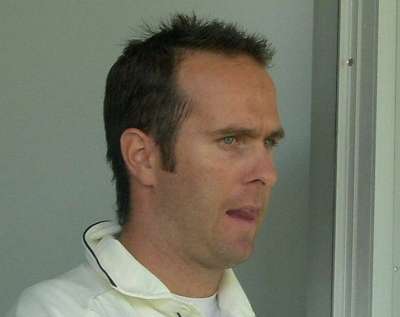
Argument No.2 – Compare the Australian teams they beat
Vaughan’s England’s beat an Australian team for the ages. Strauss’s England beat the worst Australian team for decades. In fact, The Sydney Morning Herald called the 2010/11 side the worst Australian team ever . The only point of contention down under is whether they were worst than their insipid 1978/79 counterparts. The Roar concluded that they were.
As well as Strauss’s team played – and I was jumping for joy with everyone else when it happened – let’s remind ourselves who actually represented Australia in 2010/11:
The batsmen: Shane Watson (not a real opener), Simon Katich (not a real opener), Ricky Ponting (who was 36 and a year or two past his best), Michael Clarke (who was in the middle of a dramatic two year slump at that point), Mike Hussey (a rare pillar of strength), and Marcus North (barely Test standard).
The bowlers: Ben Hilfenhaus and Peter Siddle took the new ball (nothing exactly to fear there), Mitchell Johnson (who famously bowled ‘to the left, and to the right” and almost quit cricket because his confidence was so low), and the spinners were two complete non-entities – Xavier Doherty and Michael Beer. The only class act was Ryan Harris who missed half the series with injury and wasn’t fully fit in the games he played.
On the other hand, the 2005 Australian players need no introduction at all. They hadn’t lost a series for donkeys years and went on to win a world record 16 consecutive Test victories immediately after the 2005 loss. They were a team at their peak not a team on the decline (or in transition).
Shane Warne or Michael Beer? Glenn McGrath or Ben Hilfenhaus? 2005 Ponting or 2010/11 Ponting. It’s not even close folks.
Argument No.3 – Only 4 of Strauss’s team would make Vaughan’s XI
I don’t want to take anything away from Strauss’s team. They were a fine side containing some very fine players. They’re the second best England team I’ve seen. However, I wonder how many of them would have made the 2005 starting XI? Let’s do a quick head to head. I can only find places for Prior, Swann, a more mature Ian Bell, and Jimmy Anderson.
The opening partnership
Strauss played in both teams so this one comes down to a choice between Trescothick or Cook. It’s a tough choice. Both players scored exactly the same number of runs per Test during their careers – although Cook obviously had the advantage of playing longer.
However, I’m going with Trescothick for two reasons (a) Trescothick could take the game away from the opposition (like he did at Edgbaston when England famously scored 400 runs in a day) in a way that Cook never could, and (b) the Somerset man was a better foil for Strauss.
Although Cook and Strauss were a good opening partnership they were a bit too similar. Both were stronger on the back foot and neither were particularly natural drivers of the ball. They were therefore somewhat fallible as a combination because bowlers could execute exactly the same plan to both: let them hang back in the crease and then pick them off with a fuller deliveries.
Trescothick and Strauss, on the other hand, complemented each other very nicely. Marcus planted his front foot down the wicket and biffed it with aplomb while Strauss cut the bowlers to shreds; therefore the bowlers could never settle into a particular line and length.
It’s not hard to find evidence to support my assertion here. Strauss and Cook averaged 41 as an opening combination for England while Strauss and Trescothick averaged an whopping 52 together. Case closed.
First drop
Vaughan versus Trott. This is another agonising choice. However, Vaughan wins for two reasons (a) he’s the skipper, and (b) Vaughan at his very best was capable of greatness as a batsman. Trott was a fantastic accumulator, don’t get me wrong, but he’s not quite special enough to keep out a captain who made everyone else around him better.
What’s more, Vaughan’s performances down under in 2002/03 were astonishing – the best individual performance I’ve seen from an England batsmen. Flaying peak McGrath, Warne, and Gillespie for 633 runs at an average of 63 (with 3 hundreds) was spectacular. Yes Cook and Trott were special down under in 2010/11 but they scored their runs against an attack which just doesn’t compare.
The middle order
Kevin Pietersen or Kevin Pietersen? Hmmm. I’m going with Kevin Pietersen.
Although I think KP was at his best between 2005 and 2008 when he averaged over 50, and it’s true that his form dipped significantly in 2010, I don’t think it’s worth splitting hairs here. Let’s call it a draw. Both the 2005 and 2010/11 versions of KP were awesome.
Ian Bell is a different kettle of fish though. He should never have played in 2005 – his place should’ve gone to Graham Thorpe – and the 2010/11 Bell was clearly streets ahead as a player.
Now we come to the awkward Paul Collingwood situation. It’s very hard to compare him to Andrew Flintoff, who was a very different cricketer with very different skills, but there’s only room for one of them here. And yes, it’s obviously Freddie who gets the nod.
The 2005 Flintoff was absolutely immense with both bat and ball. A match winner who enabled England to field 5 bowlers – another reason why Vaughan’s team was more agile and superior.
The keeper
First of all I’d like to thank Geraint Jones for everything he did for England. Now move to the back please Geraint. I’m going Matt Prior all the way.
I loved Prior as a cricketer. He was a swashbuckling batsman who was good enough to bat 6 rather than 7. This would’ve enabled Strauss’s England to play 5 bowlers too. However, Strauss got spooked after England were rolled over cheaply at Headlingley in the 2009 Ashes. Strauss therefore shelved the plan, his innate conservatism took hold, and he spurned this tactical advantage for the rest of his tenure. Vaughan would never have let one bad experience prevent him from fielding a truly balanced side.
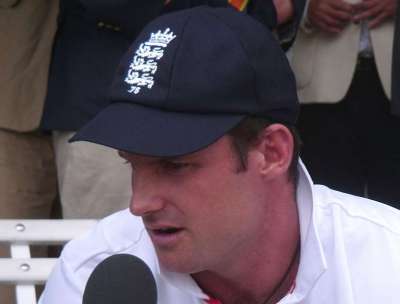
The pacemen
First I need to reiterate something. We’re very much talking about a ‘moment in time’ here. We’re not discussing the cricketers Jimmy Anderson and Stuart Broad subsequently became. We’re talking about the bowlers they were in 2010. And at that specific time Anderson averaged 29 in Test cricket and Broad averaged 34. Champions they were not. Not quite anyway.
Consequently, although Jimmy was always very good bowler, I’m not 100% sure I’d prefer him to any of the four seamers in Vaughan’s team because Harmison, Hoggard, Jones, and Flintoff complemented each other so well. The most likely candidate to make way would be Matthew Hoggard who was probably at his peak in 2005. He averaged 26 that calendar year. Jimmy therefore has a strong case but he’s not necessarily a shoo in.
It’s also important to remember that we’re not picking a composite XI here; we’re deciding which seam bowling unit was better on the whole. And that’s clearly the 2005 attack – a line up that had everything: height, guile, swing, reverse swing, plus (crucially) a surfeit of sheer pace.
Strauss’s attack was disciplined, and bowled to a plan, but there weren’t the most dangerous individually. In fact, the plan was to stop the runs and wait for the batsmen to make a mistake. It was passive rather than proactive. They didn’t seek to ‘bowl a side out’ with aggressive cricket.
The spinner
Love you Ash. But we all know where this one is going. It’s Swanny every day of the week plus an extra day the following week.
Having said that, Giles actually played a specific role really well for England in 2005. And it’s worth mentioning that Swann wasn’t actually at his best in the 2010/11 Ashes. He took just 15 wickets at an average of 40.
Swann was by far the better bowler though – albeit perhaps not quite as good as some remember. He was lethal against left handers but his record against right handers wasn’t anything to shout about (averaging 33). Let’s just say that DRS came along at exactly the right time for Graeme. He exploited it wonderfully though and I loved watching him bowl.
The captain
Strauss and Vaughan were both excellent England captains. However, they were very contrasting ones too. Vaughan was instinctive, creative, emotional, and spontaneous. Strauss was disciplined, intellectual, calm, and meticulous.
However, I’m going with Vaughan (how did you guess?) simply because he was more flexible. There were times when watching Strauss’s England could be somewhat joyless. England always had a plan, and it was usually the same plan too: bowl dry, give the batsman nothing, and wait for the opposition to implode.
Sadly, however, the very best batsmen don’t make many mistakes. Watching England’s seamers bowl to Jacques Kallis and Hashim Amla at The Oval in 2012, as the Saffers piled on 637-2, was as painful as it gets. Getting whitewashed in the UAE was another experience to forget. Strauss also had problems dismissing tail-enders due to the lack of either genuine pace or mystery spin in his XI.
Strauss and his intelligent but rigid coach Andy Flower (they were clearly in lockstep philosophically and strategically) rarely altered their attritional methodology. They were stubborn and insistent. And this was a major reason why, amongst others of course, Strauss’s England didn’t stay on top of the rankings for very long.
Vaughan’s England, on the other hand, imploded for a specific reason totally outside of their control – injuries. Simon Jones came and went in the blink of an eye; Trescothick retired prematurely due to a mental illness; Flintoff was constantly batting a chronic knee injury; Harmison got homesick; even Ashley Giles suffered a chronic hip condition. Consequently it all unravelled due to pure back luck more than misjudgement.
Vaughan’s dressing room was also harmonious for longer. His relaxed (but determined) demeanour brought the best out of his players. Rebels and free thinkers (did someone mention a certain KP?) weren’t only tolerated they were actively brought into the fold. Strauss, on the other hand, ran a military style ship. And everyone gradually found it exhausting.
Argument No.4 – Look at the win / loss ratios
It’s been a tough debate. So I’ll make my last point powerful but succinct. Just follow the wins …
Michael Vaughan’s record as captain: Won 26, lost 11, drawn 14
Andrew Strauss’s record as captain: Won 24, lost 11, drawn 15
*And don’t forget that 3 of Strauss’s wins came in 2006 when he was captaining Vaughan’s team (as an injury replacement).
This shows that England’s 2005 team (or the team that reached its peak in 2005) won more games than the 2010/11 version – 26 to 21 to be exact. Winning down under and reaching world No.1 were great achievements but you can’t argue with the win ratio, especially when the Ashes wins came against a far better Aussie team.
So surely that settles it then? Let the carnage begin in the comments below.
James Morgan



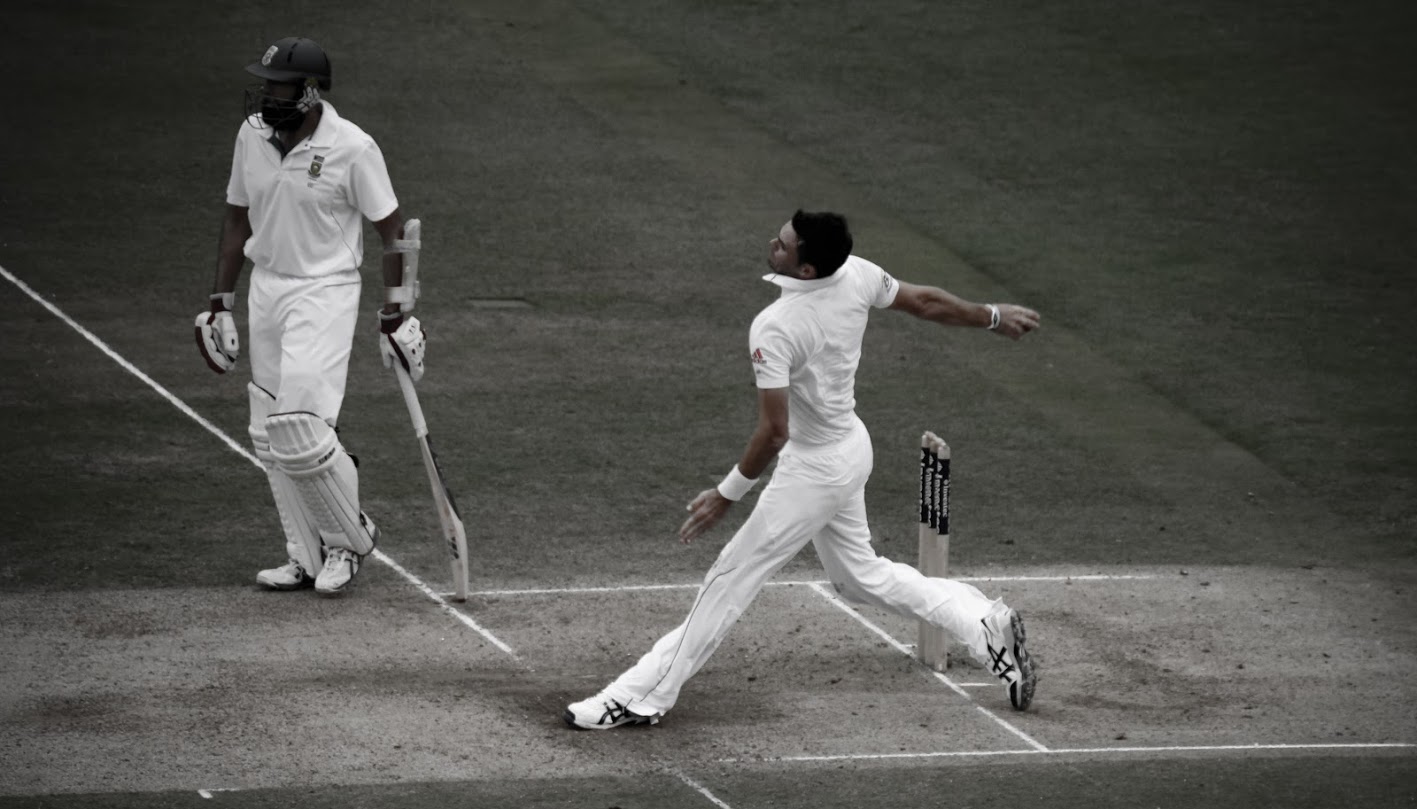
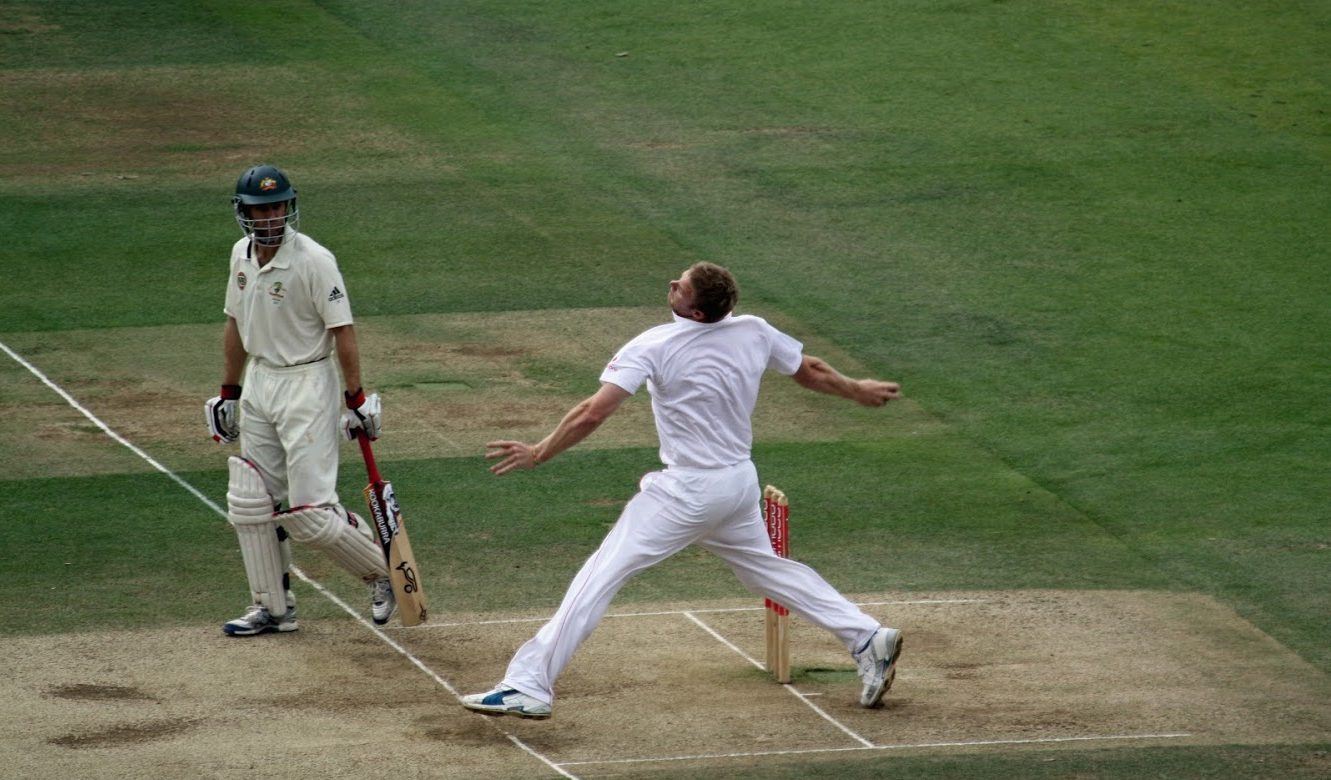
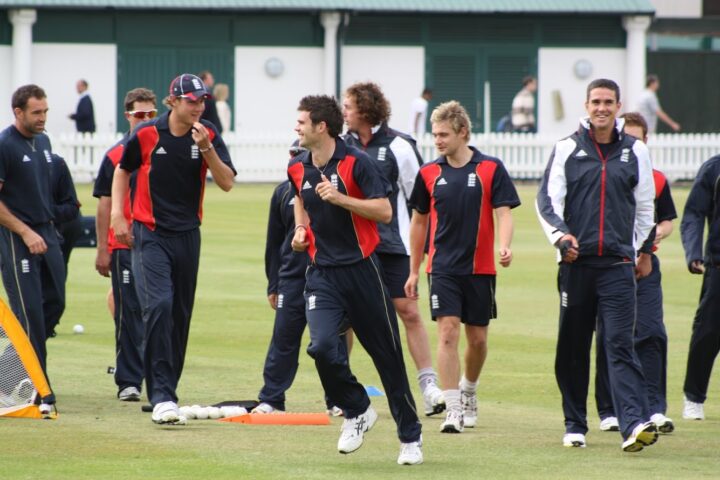



Great reading james.
I did a little exercise this week trying to pick a team from 90s 00s 10s not using the same player twice. My 00s team wins but it was fun to fit in 33 players. Who would make up your team for each??
I’d probably have more 1990s players than most. The likes of Atherton and Stewart had to bat against some of the greatest fast bowlers of all time. Think they may filled their boots against some of the bowling around these days.
Great article. I agree about 99%, only v minor quibbles: I was all for Thorpe rather than Bell and thought the selectors idiots for saying on the radio that it was KP v Thorpe. Any fool could see Bell wasn’t ready. However, Bell himself credited the hell that he went through in 2005 (by the Oval he looked shot, and hence meekly out first ball when all was to play for in Eng’s second innings) with his subsequent development. By 2009 he was the right player for much the same reasons he had been the wrong player in 2005. Even in 2006/7 McGrath (not known for generosity towards England) said Bell had earned his respect and was no longer a walking wicket. So Bell has to stay in 2005 for the benefit of England’s future (and because we know he didn’t cost England the Ashes).
Giles – one point to add about the Monarch of España is that he dismissed all of Australia’s top order in that series. No, me neither, but it’s there in Wisden.
Vaughan – 2002/3 was a great batsman – but he was a classic example of the captaincy destroying his form, and never was as captain. Or after captain – he ruined a day at Lord’s for me by scoring a selfish hundred and boring us to sleep.
I think the idea that KP was a ‘player of great innings’ rather than a great player is, all due respect, balderdash. He played far more great innings than most players in English history, and I don’t know what else you have to do to become a great player. Of course he wasn’t a team man etc but many great players aren’t. One of my favourite KP memories was actually due to another great player: David Gower was absolutely stunned when KP hit two sumptuous cover drives to the boundary, forcing the bowler to change line and length completely by going for an inswinging yorker; KP contemptuously clamped down on it and it rocketed to the boundary as a straight drive for four. ‘God he can bat …. god he can bat’ was all an awestruck Gower could manage.
Flintoff on the other hand had a couple of years as a great player – 2004/5 he was magnificent – but injuries etc soon brought him back to the pack. Much like Mitchell Johnson – who sprayed it around for years, but after staying at home for that Ashes tour and training with Dennis Lille, he then had his moment as a genuine great. By mid way through the Adelaide test in that 5-0 series, England knew they had no answer to Johnson. Just to prove it wasn’t only England’s weakness, the Australians went to South Africa immediately after and Johnson smashed them up in their back yard, forcing Graeme Smith to retire (Smith, normally a fine player of pace, found he could not get forward and down to Johnson, and thus felt his time had come).
Finally – excellent though the 2005 Aussies were, I don’t think they were quite the peak Australian side of that era. The 2001 team had a better captain as well as two world Waughs in the middle order – plus the 2005 team inexplicably kept choosing Gillespie, who KP, Tres etc treated like a Sunday league bowler. Also McGrath missed the two tests Australia lost in 2005 – though at the same time he did play in the only game Australia never had a chance of winning (3rd test). Gillespie 2001 was a much better bowler. (Lee on the other hand probably better in 2005, so that sort of balances out, while Warne/McGrath were brilliant in either year and all in between and after too).
Absolutely right ! Unarguable (?) in my book!
Australia lost a few series. Just not at home. Pakistan (1995), India (Sri Lanka (1999), India (1997/98, 2001) all managed it. And before that obviously the West Indies (pre-1995).
My argument would simply be that Australia only lost at home when Gilchrist, Warne, McGrath all had retired to South Africa (2008). The same South Africa that made mincemeat out of Strauss’ England at the Oval (2012) – a South African side that had not changed that much in the batting or bowling department (Smith, Kallis, Amla, AB, Steyn, Morkel) being the mainstays.
So barring finding a venue in which the 2011 side thrived more than the 2005 side (if such a place exists at all), the 2005 side would win it hands down.
Difficult to argue with much of the article, but I have to disagree about Prior. As has been pointed out, the England batting line up would be strong – so there is no reason to pick a keeper/bat as opposed to the best keeper. I do not think anyone would rate Prior as more than adequate at test level as a keeper, whilst Jones was clearly a much better keeper (but lesser bat). Having said that I would prefer not to have to pick either. Much better to choose a vastly superior keeper such as Foster or Read or even Steven Davies, all of whom were at their best in either 2005 or 10/11. If you have a top bowling attack and the best batsmen you should give your bowlers the best chance by choosing the best keeper.
Andy
Didn’t Fletcher consistently pick Jones ahead of Read because he thought him a better bat even though Read was a better keeper by far.
Yes and he did so for the 2006/7 disaster tour despite the fact that Read was batting better as well at that point. He applied the ludicrous criterion of ‘if you played in 2005 and want to play again you deserve the chance’. Just to cap that he put Geriant Jones on the team selection panel: ‘so, who do you think should be keeper, Geriant?’
Among other things, his rule gave us Giles ahead of Panesar despite Giles posing the square root of no threat at all on Australian soil, though he at least distracted from that with the crucial drop of Ponting at Adelaide.
Steve Davies is / was a fantastic talent. Loved watching him play. Never really got a fair crack of the whip with England. By the way, I think Prior was a keeper than Jones. England originally picked Jones over Chris Read for his batting not his keeping imho.
James & James
Thanks for that – they were very much my thoughts too. I certainly agree with you about Steve Davies – not the only keeper you could say that about – and about Prior over Jones. I’d forgotten about Jones being on the selection panel. As you say, he was unlikely to leave himself out !
Steven Davies is just one example of keepers who are discarded for not being as good with the bat (although I think that was an unfair assessment in his case). Probably the most blatant example is Michael Bates who I think is now back in minor counties cricket but who was probably the best I have seen (even better than Foakes and Davies) with the gloves when at Hampshire. It seems that selectors (whether England or county) take no account of the runs saved by a top keeper in extras and by taking catches others will drop.
The career f-c records of Davies and Prior, the player he was dropped for, are uncannily similar–as are their international T20 records, although from a small sample size in Davies’s case. Davies’s few ODIs produced a markedly better record than Prior’s, and his List A record is far superior.
As well as being pretty questionable, it was also a very quick assessment in Davies’s case. It’s difficult to see how he was judged to be not good enough ever to be recalled on a sample of 6 ODIs and 4 T20s–and I remember thinking that at the time too, as well as thinking it was pretty dumb to change your keeper for no particularly good reason four games before a World Cup, especially to recall someone who’d been dropped more than once before.
I’m sure it was nothing to do with his coming out a few weeks before the decision was made, though!
I pretty much agree with your assessment here. I remember the Amla match all too well – he set himself to play his regular ‘rock at no3’ role and not only made a triple hundred, he simply never looked like getting out. Also the 2005 side had a genuine all rounder (Flintoff’s overall career stats do not quite make him such in my opinion, but there is no doubt that for 2004, 2005 and the 2006 home season, before his decline began down under in 2006-7 he was an absolute colossus) which meant they had more options at their disposal.
I agree with you about Flintoff in terms of career stats but he was one of those players who was better than his stats because of his ability to change the course of a game with either bat or ball. If we were to attribute an importance score (this is armchair fantasy cricket after all!!) to his performances, especially his bowling, my guess is that he would come out higher.
I remember, for example, when England needed a breakthrough at Edgbaston and Vaughan (in one of his intuitive inspirational moments) turned to Freddie rather than, as expected, to Jones. In his first explosive over he dismissed Langer and Ponting and Australia went from cruising at 47 for 0 to rocking a bit at 47-2.
“The Sydney Morning Herald called the 2010/11 side the worst Australian team ever . The only point of contention down under is whether they were worst than their insipid 1978/79 counterparts. The Roar concluded that they were”.
I’d argue that the 1986/87 Aussies were worse than both of those. The 78/79 team had a good middle order of Yallop, Hughes and a very young Border, a reasonable opening attack of Hogg and Hurst and decent spin options in Higgs and Yardley. The 86/87 Aussies had an all-time great at his peak in Border but the fall-off in quality thereafter is shocking. The 86/87 England team that beat them would have lost comfortably to both the Vaughan and Strauss teams and, I would argue, the 78/79 England team (which had Boycott, Willis, Hendrick, Bob Taylor and a younger Botham).
I’d agree that the 2005 England was better than 2011 although I wouldn’t deny that the earlier team’s greater likeability and entertainment value clouds any judgment. However it does need mentioning that in 2005 England didn’t win a Test when McGrath played (and he was manifestly unfit in the OT draw).
Also relevant is that Australia had lost a number of players to their rebel tours when England got theirs back. While most rebels (from all countries) were has-beens/never would be’s, that wasn’t true of all of them. Australia could have done with Hogg and Alderman in 1985 (especially the latter), along with Yallop and Dyson as batsmen; while in 86/7 they had lost those players plus Keppler Wessels who would have given much-needed top order stability. Steve Smith (not that one) might have had a decent career, as might Mick Taylor if they’d ever chosen him.
Agree with pretty well everything you say. Personally, I would pick the 2010 Anderson ahead of the 2005 Hoggard.
For me, the bottom line (as you say) is that Vaughan’s side beat one of the best teams of all time.
I agree that Anderson is a better bowler than Hoggard, and has an unquestionable record, but I’ve been watching a lot of repeats (what else?) and Hoggard was really good during the 2005 series – much better than I remember him.
Some repeats of later series – against WI, for example – have sessions when Anderson was just about unplayable, though!
Looks like most people agree with me that the 2005 team was better.
So who were the thousands of people (and I recall it was about a thousand) who voted for Strauss’s team in that poll? Perhaps TFT’s readership is more astute than average? ;-)
As an Aussie, I’ve always been surprised at how little the other achievements of the ’05 generation get mentioned – I’d say it’s a symptom of that.
Agree – though the peak of that 2005 team was very short. Think you would have to say Trott and Anderson should on balance probably make a composite team, as well, so the composite team is evenly balanced – but the seam bowling attack of the 2005 team is markedly stronger.
Their brief period at the top means that neither team would be in the running for England’s best team of all time, though. For that (and if your comparison was speculative, Christ knows what this one is…) it’s the 19th century team that only lost one series between losing the 1882/83 Ashes and losing the 1897/98 Ashes (beating the Australians in ten series and losing only once in that period), the 1910s team that won the Ashes in 1910/11 and then won every series up to the outbreak of World War One, the 1950s side that didn’t lose a series in the period between the 50/51 Ashes and the 58/59 Ashes, and maybe just squeezing in, the late 60s team that didn’t lose a series between losing to the West Indies in 1966 and losing to India in 1971, though I think you can discount that side on the basis that they failed to regain the Ashes in that period, which counts as a defeat. So three sides. You can regret that Jardine’s England might be up there if the MCC hadn’t put international diplomacy over winning cricket matches, but they did, so it isn’t. And the peak of the 1910 to 1914 team was shorter than the other two, but it wasn’t ended by another team being better than them, which I think matters.
As to which is the greatest of these three, this comment is already far too long!
Can the disagree with your comments about Vaughan v Strauss, but can with your assessment of Ponting’s team being even the best ever Aussie outfit let anyone the best of the rest. Any team with the luxury of a Warne and McGrath are going to approach life with a feelings of invincibility.
They only became great players under Waugh’s tenure, so Ponting inherited a lot of established talent.
I know this doesn’t make Waugh’s team better per se, but its longevity for me gives it the edge.
For me Waugh is clearly the better captain, he created the whole winning culture of that team. Border may have started it but Waugh established it. His 15 consecutive test wins are testament to that. He can also lay claim to be the first of the modern day test captains, where ODI’s have become as much a part of the game as test cricket, like it or not.
My one gripe with your England comparison is choosing Vaughan ahead of Trott at no.3. For me Vaughan was never a no.3, he too often flattered to deceive and you need reliability there. Trott was born to that position, both in terms of technique and temperament, what wouldn’t we give for his like for our present team. Crawley is not yet in that class, though he may become so given time.
White ball hasn’t;’t really affected Tests by 2010/11 really… It’s probably only been since 2013 onwards we’ve seen the quality of player decline… generally
tHink about it.. England declined since 2013 and have had nothing to replace the genuine test players.. SA the same… AUS… India have only had a potential freak in Kohli and Pujara…
SL lost Mahala and Kumar and have replaced them with…. umm…..
The new world cricketing order moves another step closer:
https://www.dailytelegraph.com.au/sport/cricket/india-wants-aussie-player-availability-for-a-rescheduled-ipl-in-exchange-for-two-extra-odis/news-story/3386299ead57707ef54e9ef779d49b0c
It stinks (and no, before anyone gets on their high horse, not in the sense that Australia and England can’t run the game for themselves anymore). I’m not surprised CA could be bought off, it’s how cheaply that’s shocking: they must be in a dire way. IMagine what cricket will be like if Australia go the way of SA and WI….
BTW it’s an absolute nonsense that the IPL was cancelled for a supposed disease that has killed just over 2,000 in a country of 1.3b. It also goes to show what a farce so-called social distancing is (in India? really?).
One caveat – I wouldn’t believe the reporting figures from India, for various reasons. (Not that I believe them for other countries either).
Agreed. As a director of an insurer I remember that one of the biggest problems in life and injury claims was that death and doctors certificates were a tradable commodity in India. It was truly amazing how many people went back to visit family in India only to have the misfortune to die (at least according to the certificates!). And the actuarial analyses proved that taking out a life policy carried an excessive risk of death in the following 12 months, almost always associated with foreign travel. But our investigators had a great time going out there to look into matters – even though it never made any difference. :)
I would heartily agree that it should be Swann rather than Giles. Swann, in his second incarnation (before elbow problems), was the best English spinner I’ve seen, and I can go back to Titmus, Allen, Mortimer, and Lock (though not quite Laker).
Talking about watching replays, was Bowden not the worst Test Umpire ever? Always wanted to be the centre of attention, and so many of his decisions would have been overturned with DRS.
The geniuses at the ECB manage to take a cast iron good news’ story like their new children’s app and turn it into a cynical marketing exercise for their new tournament and piss off county supporters in the process. The game needs to socially distance itself from Tom Harrison.
New idea that, if WI and Pakistan don’t tour, England might select Test, ODI and T20 teams and they play each other on a round-robin basis.
Possible teams (assuming Leach couldn’t play because of his medical condition):
Test: Burns, Sibley, Crawley, Root (c), Stokes, Pope, Foakes, S Curran, Bess, Broad, Anderson.
ODI: Roy, Bairstow, Vince, Morgan (c), Lawrence, Denly, Ali, Woakes, T Curran, Rashid, Archer.
T20: Hales, Salt, Malan, Hain, Banton, Buttler (c), Dawson, Jordan, Wood, Parkinson, Saqib.
I’ve tried to share the big name, all-fromat players around the teams. This might actually be quite watchable with some intriguing grudge matches and a chance for some fringe players to make a name for themselves. It would almost be like the old Test trial matches that were scrapped a few decades back for no very clear reason.
Not sure if anyone is familiar with chessboxing, but a combination of say rugby and cricket might be watchable …
The obvious balance is Flintoff, Prior and Swann at 6,7 and 8. Jones, Harmison, Anderson make up the bowling line up. I’m surprised Prior and Swann didn’t play in 2005 although Jimmy was all over the place at that time so Hoggy a fair pick. I’d open with Cook and Tresco, Vaughan, KP and absolutely right Thorpe should have played ahead of Bell.
And while i’m here, Hutton, Hobbs, Sutcliffe, Hammond, Root, Botham, Knott, Truman, Laker, Willis and SF Barnes would be my all time England side but 7 of them are from the history books and apologies to Ken Barrington, and I was still tempted to pick Prior ahead of Knott to bat at 7